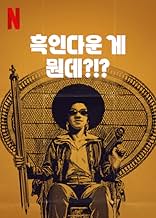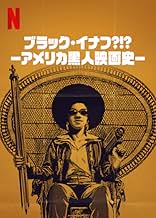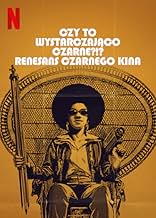El historiador y crítico cultural Elvis Mitchell analiza el cine afroamericano desde sus orígenes hasta la revolución de las influyentes películas de los años 70.El historiador y crítico cultural Elvis Mitchell analiza el cine afroamericano desde sus orígenes hasta la revolución de las influyentes películas de los años 70.El historiador y crítico cultural Elvis Mitchell analiza el cine afroamericano desde sus orígenes hasta la revolución de las influyentes películas de los años 70.
- Dirección
- Guión
- Reparto principal
- Premios
- 4 nominaciones en total
- Self
- (as Louise Archambault Greaves)
- Self
- (as Jim Signorelli)
Reseñas destacadas
The documentary delves deep enough to uncover marginalized black films intended for black audiences that have gone unnoticed by the media and the general public.
The movie's editing becomes unsteady when it jumps back and forth in time, with testimonials that elongate the script. The script also places a heavy emphasis on black films prior to 2000, leaving the film feeling incomplete or as if it is anticipating a sequel.
The bad: but after an hour this documentary veers of into all sorts of directions, becoming disjointed and long in the tooth.
It is as if this director simply had no control over his urge to namedrop as many film classics as possible and then start analysing what was wrong with them.
Recommended watch for the first hour, but I fear not many will stay focussed till the very end, because this documentary unfortunately peters out after the first hour.
Couple of comments: this is the directing debut of longtime writer, producer and film critic (including at one point for the New York Times) Eric Mitchell. Here he fondly looks back to the golden years of black film making, which he identifies as 1968 to 1978. And "film making" is to be understood in a broad sense: not just actors, but also producers and directors and anyone else involved directly and indirectly. Everyone knows of the phenom that was "Shaft" but as Mitchell demonstrates, there were so many other noteworthy black films in that era, many of which were made outside of the Hollywood studio system and hence never seen by most of us, including many of the so-called blaxploitation movies ("blaxploitation is the commoditization of blackness", observes one of the talking heads). The works of Gordon Banks and Melvin Van Peebles get extensive attention, and along the way we get dozens and dozens of movie clips, one better/more intriguing than the other. It leads one (or at least me) to want to see these movies. It was amazing for me how quickly these 2 hrs. And 15 min came and went, and a genuine pleasure to watch this from start to finish. Last but not least, in the movie's opening credits, the title is showing as "Is That Black Enough For You?!? How One Decade Forever Changed the Movies (And Me)".
"Is That Black Enough For You?!?" premiered in early October at the new York Film Festival to immediate critical acclaim, and it is currently rated 100% Certified Fresh on Rotten Tomatoes, and for good reason. If you have any interest in a slice of movie history which most of us know very little about, I'd readily suggest you check this out, and draw your own conclusion.
Basically, the issue here is that the film maker has decided that he wants to cover a LOT of Black films, which forces him to deal with some of them very quickly. One of the seven previous viewers attributes this to a desire on Mitchell's part to show off how many Black films he has seen, but that was not my impression. Rather, it's clear that he is fascinated with a lot of these movies, and intent on sharing his fascination and knowledge with us. That's hard to do in a movie, though, unlike in a book. Mitchell might have thought about doing what Ken Burns has done with some of his documentaries: focus on the most telling things in the movies themselves, and then provide the rest of the information in an accompanying picture book.
Books are good for annotated lists. Movies, not so much.
On the hand, because Mitchell sometimes seems like he is trying to be encyclopedic, some of the seven previous reviewers have criticized him for leaving out X or Y Black film or star. A few have a point, but others didn't pay attention. One complained that Mitchell left out James Brown, for example, which is not true. There is a very striking scene of Brown standing shirtless in a doorway, in all the glory of his virile, muscular, and very angry masculinity. It would have been nice to learn if he was offered roles other than those, but that would have taken more time than Mitchell had in this movie.
The same is true of some of the other previous criticism. Those viewers just didn't watch closely enough.
My take on this is that it was interesting for what it offered, but that it often left me wishing for more than just a tidbit on a given interesting movie. So, I guess, I would have preferred less encyclopedic coverage and more in-depth analysis of fewer movies.
On the other hand, I don't regret having seen any of what I saw.
Mitchell clearly knows this material. He should definitely treat us to an accompanying illustrated book, where he is not limited by time.
¿Sabías que...?
- PifiasWhile discussing Cadena perpetua (1994), the narrator identifies Rita Hayworth as white. Hayworth's real name was Margarita Carmen Cansino, and she was of Romani descent (an Indo-Aryan ethnic group, also known by the term "Gypsies"). She had her name changed, and appearance slightly altered, to aid her career. Prior to that, as Rita Cansino, she had been limited to smaller exotic roles.
On a related note, towards the end of The Shawshank Redemption, Andy has replaced the poster of Rita Hayworth with a poster of Raquel Welch. Welch was born Jo Raquel Tejada, but went by "Raquel Welch" for the sake of her career (to avoid getting trapped into roles available to Latinas). She did not acknowledge her true heritage until she worked on American Family (2002).
- Citas
Harry Belafonte: Not one picture that I turned down did I regret not doing. I didn't resent any of them. I'm glad others got an opportunity and went off and did it, but my initial... First and foremost, I'm an artist. I'm an actor. And I came out of a school with Marlon Brando, Walter Matthau, Rod Steiger, Tony Curtis, with a director that gave us no quarter. I'm not gonna do anything other than what I think is worthy of being done. And fortunately for me, I was a runaway success in the world at large because I had a globe so passionately approving of my presence in their midst that nobody could dismiss the fact that that thing on the horizon called Belafonte could really not be fucked with. Because anytime anybody came up and gave me an ultimatum, I said, "Fuck you. I'm going to Paris. I'll probably live there if I like, but I... I have a destination that answers your denial of what I could be."
- ConexionesFeatures A Fool and His Money (1912)
Selecciones populares
- How long is Is That Black Enough for You?!??Con tecnología de Alexa
Detalles
- Fecha de lanzamiento
- País de origen
- Sitio oficial
- Idioma
- Títulos en diferentes países
- Is That Black Enough for You?!?
- Empresas productoras
- Ver más compañías en los créditos en IMDbPro
- Duración2 horas 15 minutos
- Color
- Mezcla de sonido
Contribuir a esta página






































